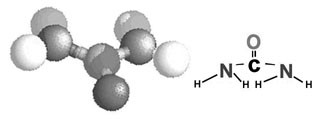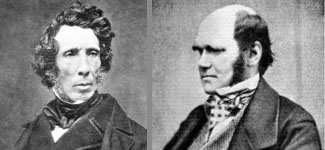The Reading Selection from Ludwig Feuerbach
[Unification of Science of Natural Processes]
…empirical natural science made such an advance and achieved such brilliant results that not only did it become possible to overcome completely the mechanical one-sidedness of the eighteenth century, but natural science itself was, through the proof of the inter-relation existing in nature itself between the various spheres of investigation (mechanics,physics, chemistry, biology, etc.), transformed from an empirical into a theoretical science and, by the integration of the results achieved, into a system of materialistic knowledge of nature. The mechanics of gasses; newly created organic chemistry, which stripped the last remnants of incomprehensibility from the so-called organic compounds, one after the other, by preparing them from inorganic materials; the science of embryology which dates back to 1818; geology, palaeontology and the comparative anatomy of plants and animals—all of them provided new material to an unprecedented extent. Three great discoveries, however, were of decisive importance.

Structure of Urea
[Transformation of Energy and Motion]
The first was the proof of the transformation of energy obtained from the discovery of the mechanical equivalent of heat (by Robert Mayer, Joule and Colding). All the innumerable operative causes in nature, which until then had led a mysterious inexplicable existence as so-called "forces"—mechanical, force, heat, radiation (light and radiant heat), electricity, magnetism, the force of chemical combination and dissociation—are now proved to be special forms, modes of existence of one and the same energy, i.e., motion. We are not only able to demonstrate their perpetual transformation in nature from one form into another, but we can carry out this transformation itself in the laboratory and in industry and this in such a way that a given quantity of energy in one form always corresponds to a given quantity of energy in this or that other form. Thus we can express the unity of heat in kilogram-meters, and again the units of any quantity of electrical or chemical energy in unity of heat and vice versa. Similarly we can measure the consumption and supply of energy to a living organism, and express these in any unity desired, e.g., in units of heat. The unity of all motion in nature is no longer a philosophical assertion but a fact of natural science.
[Life Explained by Scientific Law]
The second—chronologically earlier—discovery was that of the organic cell by Schwann and Schleiden—of the cell as the unity, out of the multiplication and differentiation of which all organisms, except the very lowest, arise and develop. With this discovery, the investigation of the organic, living products of nature—comparative anatomy and physiology, as well as embryology—was for the first time put upon a firm foundation. The mystery was removed from the origin, growth and structure of organisms. The hitherto incomprehensible miracle resolved itself into a process taking place according to a law essentially identical for all multicellular organisms.
[Origins of the Varieties of Organisms]
But an essential gap still remained. If all multi-cellular organisms—plants as well as animals, including man—grow from a single cell according to the law of cell-division, whence, then comes the infinite variety of these organisms? This question was answered by the three great discovery, the theory of evolution, which was first presented in connected from and substantiated by Darwin. However numerous the modifications in details this theory Will yet undergo, it nevertheless, on the whole, already solves the problem in a more than satisfactory manner. The evolutionary series of organisms from few and simple to increasingly manifold and complex forms, as we see them today before our eyes, right up to and including man himself, has been proved in all its main basic features. Thereby not only has an explanation been made possible for the existing stock of the organic products of nature, but the basis has been given for the announced-history of the human mind, for following all its various stages of evolution from the protoplasm, simple and structureless yet responsive to stimuli, of the lower organisms right up to the thinking human brain. Without this prehistory, however, the existence of the thinking human brain remains a miracle.

Friedrich Wöhler and Charles Darwin, adapted from Annenberg Rare Book and Manuscript Library
[Origin of Life]
With these three great discoveries, the main processes of nature are explained and traced back to natural causes. Only one thing remains to to done here: to explain the origin of life from inorganic nature. At the present stage of science, that means nothing else than the preparation of albuminous bodies from inorganic materials. Chemistry is approaching ever closer to this task. it is still a long way from it. But when we reflect that it was only in 1828 that the first organic body, urea, was prepared by Wöhler from inorganic materials and that innumerable so-called organic compounds are now artificially prepared without any organic substances, we shall not be inclined to bid chemistry halt before the production of albumen. Up to now, chemistry has been able to prepare any organic substance the composition of which is accurately known. As soon as the composition of albuminous bodies shall have become known, it will be possible to proceed to the production of live albumen. But that chemistry should achieve over night what nature herself even under very favorable circumstances could succeed in doing on a few planets after millions of years—would be to demand a miracle.
[Scientific Materialism]
The materialist conception of nature, therefore, stands today on very different and firmer foundations than in the last century. Then it was only the motion of the heavenly bodies and of rigid terrestrial bodies under the influence of gravity that was thoroughly understood to some extent. Almost the whole sphere of chemistry and the whole of organic nature remained an incomprehensible secret. Today, the whole of nature is laid open before us as a system of interconnections and processes which have been, at least in their main features, explained and comprehended. Indeed, the materialistic outlook on nature means no more than simply conceiving nature just as it exists without any foreign admixture, and as such it was understood originally among the Greek philosophers as a matter of course. But between those old Greeks and us lie more than two thousand yeas of an essentially idealistic world outlook and hence the return to the self-evident is more difficult than it seems as first glance. For the question is not at all one of simply repudiating the whole thought-content of those two thousand years but of criticizing it in order to extricate from within the false, but for its time and the process of evolution even inevitable, idealistic form, the results gained from this transitory form. And how difficult that is, is demonstrated for us by those numerous scientists who are inexorable materialists within their science but who, outside it, are not only idealists but even pious, nay orthodox, Christians.